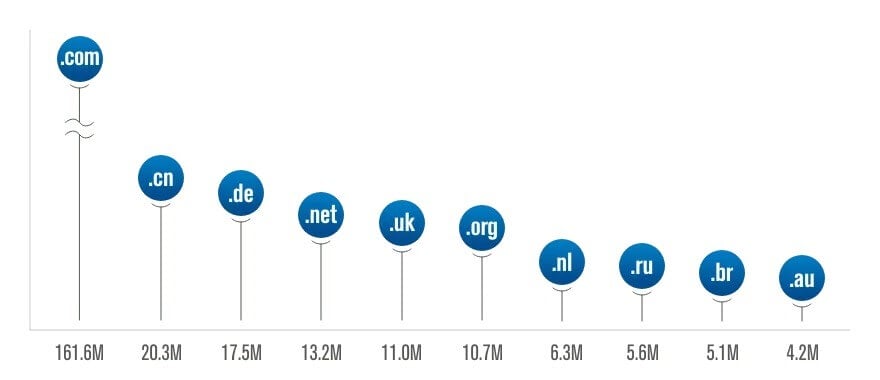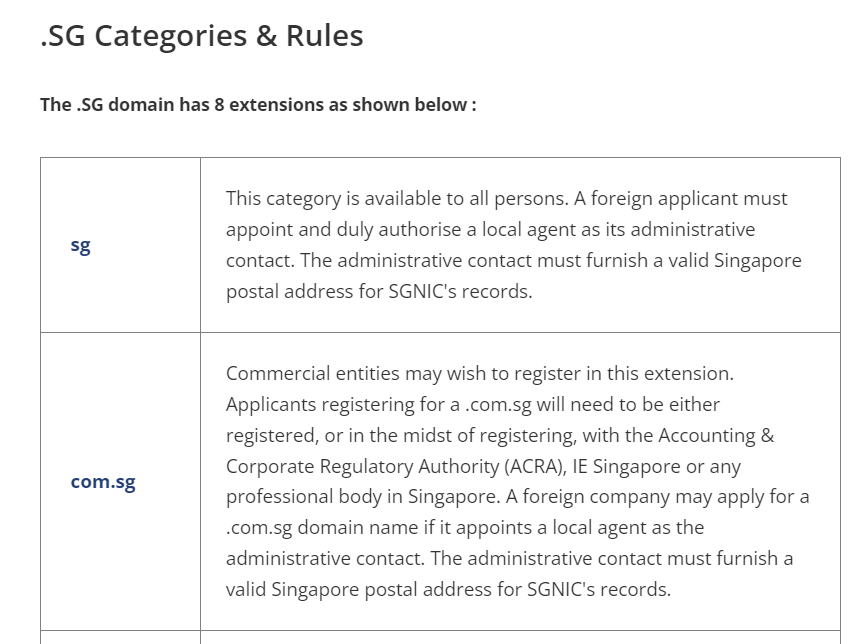If you’ve made the decision to register a domain in Singapore, it can be quite difficult to choose the correct domain. The reason for that is because there are many different Singapore domains you can register, which are as follows:
- .sg
- .com.sg
- .org.sg
- .edu.sg
- .gov.sg
- .net.sg
You can even register non-English domains such as the Chinese language .新加坡 and Tamil language .சிங்கப்பூர்.
Despite the many options available, most people looking to buy a Singapore domain tend to seriously consider only two of them.
In one corner you have .sg domain names and in the other .com.sg domain names. Which one should you go with? Is one better than the other? Do they have any major differences? Let’s answer these questions and more in a .sg vs .com.sg head-to-head analysis.
What Audiences Do .sg And .com.sg Reach?
Once you register a Singapore domain, as long as you’re not intending to break any laws with the content of your website or spamming email addresses, there’s no defined explanation about how you should use the domain. That doesn’t mean they should be used in all situations though.
For both .sg and .com.sg domains, while you can use them for anything, they should both be primarily used to target an audience within Singapore. You wouldn’t register either if you wanted to reach an Australian audience.
The .sg domain is designed to be used to reach any Singapore audience and the .com part of .com.sg is short for commercial, which means it’s meant to be used by Singapore businesses for commercial uses. Despite the intended use, it’s not like your .com.sg domain will be deleted if you host a personal blog website though so in reality, .com.sg can be used for all audiences.
If you’re looking to reach any audience in Singapore, .sg and .com.sg have you covered.
Will Domain Availability Be an Issue For .sg And .com.sg?
For domains like .com, where there are over 150 million registered domains, it can be almost impossible to register the exact domain name you want. The same can be said for some country domains too, as shown in the total domain registrations image below.

Source: Source: ZookNIC, Q1 2023; Verisign, Q1 2023; Centralized Zone Data Service, Q1 2023
Thankfully, you most likely won’t need to get creative with your Singapore domain name as there are 200,000 Singapore domains currently registered. This still looks like a big number but when compared to country domains like .de or .uk, it’s quite small.
It’s unknown what share each .sg and .com.sg have of the 200,000 registered domains. If they both have a 50/50 split (ignoring the other Singapore domains) that would give each 100,000 registered domains, meaning domain availability shouldn’t be a problem for either domain so you should have no issues registering the exact .sg or .com.sg domain you want.
Just a heads up before we proceed, if 160 million registered domains doesn’t deter you and you’re considering registering a .com domain, we have a useful .com vs. .sg article available.
.sg vs .com.sg SEO
Generally, search engines like Google will prioritize showing localised search results in localised search engines, which makes perfect sense. If you were in Singapore and looking for a good pizza place, it wouldn’t be a good user experience if Google gave you a bunch of listings on the search results page for pizza restaurants from the United States or the United Kingdom.
For the above reason, both .sg and .com.sg will be treated as Singapore-targeted domains by search engines so both should receive a ranking boost in search engines like google.com.sg.
Will either domain give you a boost over the other though? Probably not. From a marketability point of view, it’s usually a good idea to go with the most popular domain in a country as it can help your website appear more trustworthy. If your website is more trustworthy then it could receive more clicks in search engines and more clicks can lead to better rankings.
While in some countries there’s a local domain that’s easily the most popular choice, such as .com.au in Australia, this doesn’t really exist in Singapore. Both .sg and .com.sg are very popular domains so nobody is going to hesitate about visiting a website that uses either domain.
For the .sg vs .com.sg SEO category, both domains are good for Singapore SEO, but neither will give you a boost over the other.
Is There a Price Difference Between .sg And .com.sg?
There’s very little price difference between .sg and .com.sg. Either domain can be registered in the $40 – $60 SGD range with most Singapore-based domain registrars.
At OnlyDomains specifically, we charge $54.90 SGD ($41.99 USD) to register a .sg domain and $65.90 SGD ($49.99 USD) to register a .com.sg domain. All domain registration benefits, such as free business email trials and DNS hosting, are included with both domains.
A very big price advantage for .sg over .com.sg though is that there’s an annual promotion period called ‘I Love .SG’ where you can register .sg domains for around $10 SGD for the first year of registration. The promotion is only applicable to .sg domains (plus the non-English versions of .sg) so no discount is available for .com.sg domains.
If price is a concern for you, it might be worth waiting for the I Love .SG promotion, which normally occurs during August as part of the Singapore National Day celebrations, to register a cheap .sg domain name. Please remember though that once it’s time to renew the domain, you’ll go back to paying the $40 – $60 SGD price.
Does .sg Or .com.sg Have Domain Requirements?
A lot of country domain names have requirements that need to be met before you can successfully register one. Both .sg and .com.sg are no exceptions as each have their own unique set of restrictions.
For .sg, the domain requirements are quite loose, where only the administrative contact associated with the domain needs to have a local Singapore postal address.
For .com.sg, the requirements will differ depending on your location. If you’re based in Singapore, then you’ll need to have a Singapore company registered, or in the process of being registered. If you’re located outside of Singapore, then you should be a registered foreign company.
The .sg local Singapore postal address requirement also applies to .com.sg domains too.
Here’s a screenshot of the exact requirements, as defined by SGNIC.

Source: SGNIC .SG Category Rules
As you can see, it’s not as easy to register a Singapore domain as something like a .com domain. It can be quite hard to register one, especially if you’re located outside Singapore. Having said that, lots of domain registrars that provide .sg domain registration services also offer .sg domain agency services. What this means is that the domain registrar will appoint an approved representative on your behalf to meet the Singapore postal address requirement, which should allow you to register your desired Singapore domain without issue.
So, Is .sg Or .com.sg Better?
We’ve made it to the end of our .sg vs .com.sg analysis. So, what’s better between the two? To help us reach a verdict, here’s the above talking points aligned in a nice, little table.
| .sg | .com.sg | |
| Registration Price | $54.90 SGD | $65.90 AUD |
| Target Audience | Singapore audiences | Singapore audiences |
| Availability | Not Limited | Not Limited |
| Popularity | Very popular in Singapore | Very popular in Singapore |
| SEO | Benefits in Singapore | Benefits in Singapore |
| Requirements | Anyone with Singapore address | Businesses with Singapore Adress |
After looking at this table, the question probably shouldn’t be ‘Is .sg or .com.sg better?’ but rather ‘Is .sg or .com.sg better for me?’ as both domains appear to have their own target audience.
If you’re looking to register a domain in Singapore for any other reason, perhaps a .sg domain is the right domain to choose.
If you’re looking to register a Singapore domain for business and commercial reasons, perhaps a .com.sg domain is the way to go. Having said that, while .com.sg is seemingly better for business purposes, this hasn’t stopped very popular online stores like Shopee and Carousell from using a .sg for their websites.
In the end, there’s probably no correct answer to the what’s better question. If you want to register a Singapore domain, you really can’t go wrong with either .sg or .com.sg.
